- Sanitation systems
- Toilets with urine diversion
- Urinals
- Simple urine valves to control odour on waterless urinals or on urine diversion toilets
Simple urine valves to control odour on waterless urinals or on urine diversion toilets
89.1k views
Re: Simple urine valves to control odour on waterless urinals with a soil filter for the air
Hi everyone,
I have designed a Christmas present for you and the whole world.
It is a simple Waterless Urinal with no odors, since the funnel connects to a hose that goes to the bottom of the jug and the displaced air has to filter through fertile soil, thus cleansing any odors. It is made with recycled materials, aside from an inexpensive plastic funnel.
inodoroseco.blogspot.com/2015/12/un-nuev...inario-sin-agua.html
This is a great way to waste less clean water, not contaminate rivers, and conveniently store fertilizer to later give to our plants.
I look forward to seeing your comments and suggestions.
Best wishes,
Chris Canaday
I have designed a Christmas present for you and the whole world.
It is a simple Waterless Urinal with no odors, since the funnel connects to a hose that goes to the bottom of the jug and the displaced air has to filter through fertile soil, thus cleansing any odors. It is made with recycled materials, aside from an inexpensive plastic funnel.
inodoroseco.blogspot.com/2015/12/un-nuev...inario-sin-agua.html
This is a great way to waste less clean water, not contaminate rivers, and conveniently store fertilizer to later give to our plants.
I look forward to seeing your comments and suggestions.
Best wishes,
Chris Canaday
Conservation Biologist and EcoSan Promoter
Omaere Ethnobotanical Park
Puyo, Pastaza, Ecuador, South America
inodoroseco.blogspot.com
Omaere Ethnobotanical Park
Puyo, Pastaza, Ecuador, South America
inodoroseco.blogspot.com
Attachments:
-
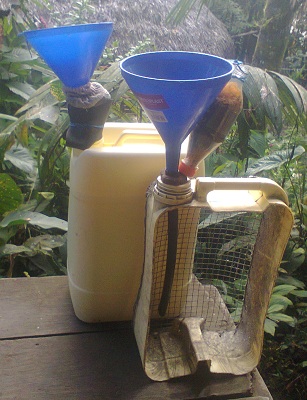 twomodelsofWU.jpg
(Filesize: 65KB)
twomodelsofWU.jpg
(Filesize: 65KB)
Please Log in to join the conversation.
You need to login to replyRe: Simple urine valves to control odour on waterless urinals or on urine diversion toilets
When working with vegetable oils, another factor is their different melting temperatures. Coconut oil for example turns into a butter like solid below 20°C or so.
Please Log in to join the conversation.
You need to login to reply- former member
-
Less
- Posts: 101
- Likes received: 3
Re: Simple urine valves to control odour on waterless urinals or on urine diversion toilets
Dear Linus:
Very intersting and clever setup. This set up certainly works. I feel that the oil might be temporarily mixed with the urine when urine passes through the tube but the oil will be boyed up immediately and seals the top. The length of tube is also important because the tube space must provide enough volume to hold the mixture of urine and oil while the previous urine is being displaced out of the tube space. I also think the tube acts as tube settler (in the floating sense) and am wondering if there is an optimum angle for faster sepration. I am currently experimenting if vegetable oil can work.
++++++++
Note by moderators: This post was made by a former user with the login name Ababu who is no longer a member of this discussion forum.
Very intersting and clever setup. This set up certainly works. I feel that the oil might be temporarily mixed with the urine when urine passes through the tube but the oil will be boyed up immediately and seals the top. The length of tube is also important because the tube space must provide enough volume to hold the mixture of urine and oil while the previous urine is being displaced out of the tube space. I also think the tube acts as tube settler (in the floating sense) and am wondering if there is an optimum angle for faster sepration. I am currently experimenting if vegetable oil can work.
++++++++
Note by moderators: This post was made by a former user with the login name Ababu who is no longer a member of this discussion forum.
Please Log in to join the conversation.
You need to login to replyRe: Simple urine valves to control odour on waterless urinals or on urine diversion toilets
Reading this thread made me think about the odour traps we installed in water less urinals in some offices in Ouagadougou, Burkina Faso back in 2008 when I worked there. The attached file gives some examples with photos and explanation.
It was using the u-bend or loop principle with some paraffin oil added to the urinal, which stays on top of the urine. The u-bend or loop part of the pipe was just hooked on the wall and could be detached and lifted and when deposits needed to be rinsed out. New oil was added some every few months as needed. Paraffin oil can be found at pharmacies, and has no smell and is a mineral oil so it doesn't oxidize. Maybe it works just as well with cooking oil or other available oils - we didn't try.
At least for the 2 years more I stayed these simple traps were working, I don't know about the present status...
Regards
Linus
This attachment is hidden for guests.
Please log in or register to see it.
Please log in or register to see it.
It was using the u-bend or loop principle with some paraffin oil added to the urinal, which stays on top of the urine. The u-bend or loop part of the pipe was just hooked on the wall and could be detached and lifted and when deposits needed to be rinsed out. New oil was added some every few months as needed. Paraffin oil can be found at pharmacies, and has no smell and is a mineral oil so it doesn't oxidize. Maybe it works just as well with cooking oil or other available oils - we didn't try.
At least for the 2 years more I stayed these simple traps were working, I don't know about the present status...
Regards
Linus
This message has an attachment file.
Please log in or register to see it.
Please Log in to join the conversation.
You need to login to reply- former member
-
Less
- Posts: 101
- Likes received: 3
Re: Simple urine valves to control odour on waterless urinals or on urine diversion toilets
A good, air tight, urine odour trap has been designed by our project team using rubber seal and elastic rubber that are combined with a tennis ball. It has been provided to the urinals of the UDDT provided at the car wash center in Mbabane city, Swaziland. A pdf file description of the odour trap is provided below.
++++++++
Note by moderators: This post was made by a former user with the login name Ababu who is no longer a member of this discussion forum.
This attachment is hidden for guests.
Please log in or register to see it.
Please log in or register to see it.
++++++++
Note by moderators: This post was made by a former user with the login name Ababu who is no longer a member of this discussion forum.
This message has an attachment file.
Please log in or register to see it.
The following user(s) like this post: AquaVerde
Please Log in to join the conversation.
You need to login to replyRe: Simple urine valves to control odour on waterless urinals or on urine diversion toilets
Kim - This is brilliant! Thanks so much for sharing. 
Kai Mikkel Førlie
Founding Member of Water-Wise Vermont (formerly Vermonters Against Toxic Sludge)
Founding Member of Water-Wise Vermont (formerly Vermonters Against Toxic Sludge)
Please Log in to join the conversation.
You need to login to replyRe: Simple urine valves to control odour on waterless urinals or on urine diversion toilets
Dear Ababu,
Good question about the need of the cuts along the side. The bicycle tube is left open towards the bottom, so there is no problem for the urine to pass. However, making the slits along the sides (as I indicated in the image in my last post) produces two flaps. This way you avoid creating openings at the side, which happen if you don’t make the cuts. The two flaps will stick together after the passage of urine and create a perfect seal. I hope this explanation makes more sense.
If you attach this piece of rubber at the end of the urine pipe where it enters the collection container, there is no need (in my experience) for any other odor control earlier in the system (i.e. in the urinal or in the UD-toilet), since this will avoid gases being ventilated up in the pipe system. Of course it is always important to try to keep the urinal/urine bowls clean from urine as well, which regularly could be done by adding some drips of water. You are probably aware of the possibility to use a small PET bottle with a small hole in the cap to make a good cleaner, just consuming very small amounts of water (see photo that I took in a operation and maintenance workshop in Bolivia).
All the best,
Kim
Good question about the need of the cuts along the side. The bicycle tube is left open towards the bottom, so there is no problem for the urine to pass. However, making the slits along the sides (as I indicated in the image in my last post) produces two flaps. This way you avoid creating openings at the side, which happen if you don’t make the cuts. The two flaps will stick together after the passage of urine and create a perfect seal. I hope this explanation makes more sense.
If you attach this piece of rubber at the end of the urine pipe where it enters the collection container, there is no need (in my experience) for any other odor control earlier in the system (i.e. in the urinal or in the UD-toilet), since this will avoid gases being ventilated up in the pipe system. Of course it is always important to try to keep the urinal/urine bowls clean from urine as well, which regularly could be done by adding some drips of water. You are probably aware of the possibility to use a small PET bottle with a small hole in the cap to make a good cleaner, just consuming very small amounts of water (see photo that I took in a operation and maintenance workshop in Bolivia).
All the best,
Kim
Kim Andersson
Stockholm Environment Institute
Postbox 24218,104 51 Stockholm, Sweden
This email address is being protected from spambots. You need JavaScript enabled to view it.
Stockholm Environment Institute
Postbox 24218,104 51 Stockholm, Sweden
This email address is being protected from spambots. You need JavaScript enabled to view it.
Attachments:
-
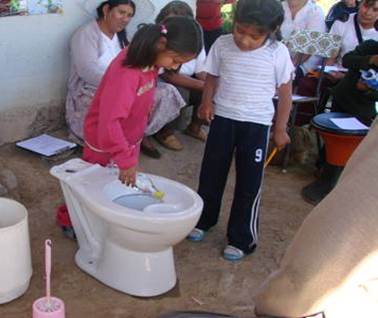 Cleaningur...owl1.jpg
(Filesize: 18KB)
Cleaningur...owl1.jpg
(Filesize: 18KB)
Please Log in to join the conversation.
You need to login to reply- former member
-
Less
- Posts: 101
- Likes received: 3
Re: Simple urine valves to control odour on waterless urinals or on urine diversion toilets
Dear Kim:
I really appreciate your innovation and have to admit the rubber is much better than ours in terms of its durability. This is something worth trying.In our project we have also employed more durable material tied to elastic bands such as wrapped tennis balls that are wrapped with plastic bags and then tied to elastic bands as well as wrapped cotton wool ( wrapped with plastic bag) and tied to elastic bands. Both work quite well. I have a question though: is the bottom horizontal base of the rubber sealed so that the urine flows only through the cut vertical edges? Otherwise why is it necessary to cut the edges because the urine can simply pass through the base? or will it not pass?
++++++++
Note by moderators: This post was made by a former user with the login name Ababu who is no longer a member of this discussion forum.
I really appreciate your innovation and have to admit the rubber is much better than ours in terms of its durability. This is something worth trying.In our project we have also employed more durable material tied to elastic bands such as wrapped tennis balls that are wrapped with plastic bags and then tied to elastic bands as well as wrapped cotton wool ( wrapped with plastic bag) and tied to elastic bands. Both work quite well. I have a question though: is the bottom horizontal base of the rubber sealed so that the urine flows only through the cut vertical edges? Otherwise why is it necessary to cut the edges because the urine can simply pass through the base? or will it not pass?
++++++++
Note by moderators: This post was made by a former user with the login name Ababu who is no longer a member of this discussion forum.
Please Log in to join the conversation.
You need to login to replyRe: Simple urine valves to control odour on waterless urinals or on urine diversion toilets
[Start of Page 4 of the discussion]
Dear Ababu and all,
I really like the experiences you have been sharing in this thread. I think it is important that we always see how we can minimize odors from urine diverting systems. In the best case we can find inexpensive locally available simple measures and materials, as you are suggesting.
I would also like to share some personal experience I have had on this topic when I worked with a project in an indigenous community in Colombia, a couple of years ago. We also tried using condoms as odor trap, but we didn’t find it to be a very feasible solution, since the material is very thin and becomes quite unpleasant fairly quickly. What we did was taking the tube of bicycle tires. In our case we could acquire these old tubes for free in bicycle repair shops.
The tube is cut to create a ten centimeter long hose. Starting from one of the short edge (where the tube has been cut), you make few centimeters cuts along the long edge, on opposite sides of the tube. I’ve tried to show this on the image below. Then the uncut side is pulled onto the urine pipe or possibly also onto the pipe of a funnel (which I haven’t tried though). This creates a very functional trap, that we found to be working as well as some of the odor traps used in some of the industrially produced urinals on the market (presented at the beginning of this thread). By adding this tube at the end of the pipe, it is not necessary to have the urine pipe entering deeply into the container, which is good, since this often makes it a bit tricky to change containers.
Looking forward to hear more about your innovations on low-cost odor control!
Best regards,
Kim
Dear Ababu and all,
I really like the experiences you have been sharing in this thread. I think it is important that we always see how we can minimize odors from urine diverting systems. In the best case we can find inexpensive locally available simple measures and materials, as you are suggesting.
I would also like to share some personal experience I have had on this topic when I worked with a project in an indigenous community in Colombia, a couple of years ago. We also tried using condoms as odor trap, but we didn’t find it to be a very feasible solution, since the material is very thin and becomes quite unpleasant fairly quickly. What we did was taking the tube of bicycle tires. In our case we could acquire these old tubes for free in bicycle repair shops.
The tube is cut to create a ten centimeter long hose. Starting from one of the short edge (where the tube has been cut), you make few centimeters cuts along the long edge, on opposite sides of the tube. I’ve tried to show this on the image below. Then the uncut side is pulled onto the urine pipe or possibly also onto the pipe of a funnel (which I haven’t tried though). This creates a very functional trap, that we found to be working as well as some of the odor traps used in some of the industrially produced urinals on the market (presented at the beginning of this thread). By adding this tube at the end of the pipe, it is not necessary to have the urine pipe entering deeply into the container, which is good, since this often makes it a bit tricky to change containers.
Looking forward to hear more about your innovations on low-cost odor control!
Best regards,
Kim
Kim Andersson
Stockholm Environment Institute
Postbox 24218,104 51 Stockholm, Sweden
This email address is being protected from spambots. You need JavaScript enabled to view it.
Stockholm Environment Institute
Postbox 24218,104 51 Stockholm, Sweden
This email address is being protected from spambots. You need JavaScript enabled to view it.
Attachments:
-
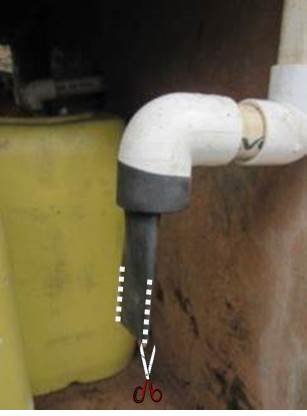 Odortrap1.jpg
(Filesize: 11KB)
Odortrap1.jpg
(Filesize: 11KB)
The following user(s) like this post: Florian, HAPitot
Please Log in to join the conversation.
You need to login to reply- former member
-
Less
- Posts: 101
- Likes received: 3
Re: Simple urine valves to control odour on waterless urinals or on urine diversion toilets
We also have two additional successful innovations of the elastic balloon odour trap. The first one uses the balloon at the bottom of the funnel and will not be visible. It has smaller size to enter a pipe or jerrycan and has the advantage (disadvantage) that it will not be visible. The second innovation consists of a double balloon trap that consists of balloons on both the inside and outside of the funnel. The two balloons are set independently from each other as otherwise they will cancel each other out where one will pull the other to close/open position if they are connected with each other. I have attached the photos of these two alternative innovations.
[End of Page 3 of the discussion]
++++++++
Note by moderators: This post was made by a former user with the login name Ababu who is no longer a member of this discussion forum.
[End of Page 3 of the discussion]
++++++++
Note by moderators: This post was made by a former user with the login name Ababu who is no longer a member of this discussion forum.
Attachments:
-
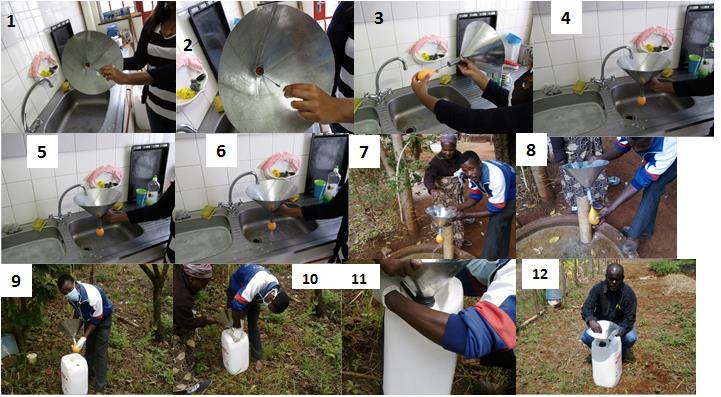 Alt_Bal_Pos_1.jpg
(Filesize: 68KB)
Alt_Bal_Pos_1.jpg
(Filesize: 68KB)
-
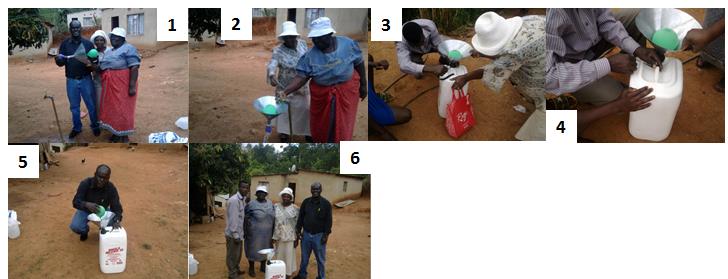 Double_Bal...ap_1.jpg
(Filesize: 34KB)
Double_Bal...ap_1.jpg
(Filesize: 34KB)
Please Log in to join the conversation.
You need to login to reply- former member
-
Less
- Posts: 101
- Likes received: 3
Re: Simple urine valves to control odour on waterless urinals or on urine diversion toilets
Dear Chris:
Thank you for your comments and very interesting suggestion including that of cutting plastic collectors from bigger plastic bottles (i wish i knew this before!)You are right on photo 8, i just used it for demonstration otherwise the elastic string was way too tight and the buoyant force required was so high that the water level has to rise too high after which it suddenly opens and allows a gap for water to gush out of the funnel. However, even after allowing the water to pass the balloon closes before all the water is drained.
However, this problem is avoided with a moderate stretching of the elastic band and that can be set quite comfortably by little trial and error. One thing i noticed is to increase the buoyant force with little amount of urine, the bottom opening area of the funnel should be increased as in the bigger metal funnel we manufactured and unlike the plastic funnel that has narrower area. That will allow the balloon to be easily lifted (according to Archimedes principle )with a small amount of urine.The balloon size is also a factor...larger balloons are easier to lift.
The plastic funnel is very good as you said it is corrosion resistant and smooth for effective closing. However, the size we had and we could manage to get, we thought, was a bit small for men to pass their urine on comfortably without splashing the urine around. We looked the entire town for a bigger plastic funnel but that size you see on the photo was what we could manage to get. But that could also be oK for collection from pipes.
We decided to manufacture a bigger size metal funnel ourselves for direct collection of urine on to storage tanks from men. Otherwise as you said the plastic funnel would be very good and the metals can corrode in the manner that you rightly suggested. However, I have read one research work from an American M.Sc. student in Mali where galvanized metal funnel urine collectors operated for a number of years. The galvanized metal is sharp at the top although that could be bent.
The funnels are for the moment directly mounted on to 25 liter plastic storage tanks tied with rubber bands. However, we are thinking of making special urinal collector shapes that may be connected with pipe to the storage tank in the near future. We have a regular training workshop with the community where we have a discussion on all those aspects of urine collection, storage, dilution, application,etc., and have managed to get a number of volunteers who would try it at their homes. We use the experience of urine fertilization elsewhere including the ROSA project in Arbaminch, Ethiopia for which i was the team leader for the period between 2006 and 2008. We are just starting. We meet every week as a regular follow up. We also go around the home to monitor the storage of urine, planting and application of urine.
++++++++
Note by moderators: This post was made by a former user with the login name Ababu who is no longer a member of this discussion forum.
Thank you for your comments and very interesting suggestion including that of cutting plastic collectors from bigger plastic bottles (i wish i knew this before!)You are right on photo 8, i just used it for demonstration otherwise the elastic string was way too tight and the buoyant force required was so high that the water level has to rise too high after which it suddenly opens and allows a gap for water to gush out of the funnel. However, even after allowing the water to pass the balloon closes before all the water is drained.
However, this problem is avoided with a moderate stretching of the elastic band and that can be set quite comfortably by little trial and error. One thing i noticed is to increase the buoyant force with little amount of urine, the bottom opening area of the funnel should be increased as in the bigger metal funnel we manufactured and unlike the plastic funnel that has narrower area. That will allow the balloon to be easily lifted (according to Archimedes principle )with a small amount of urine.The balloon size is also a factor...larger balloons are easier to lift.
The plastic funnel is very good as you said it is corrosion resistant and smooth for effective closing. However, the size we had and we could manage to get, we thought, was a bit small for men to pass their urine on comfortably without splashing the urine around. We looked the entire town for a bigger plastic funnel but that size you see on the photo was what we could manage to get. But that could also be oK for collection from pipes.
We decided to manufacture a bigger size metal funnel ourselves for direct collection of urine on to storage tanks from men. Otherwise as you said the plastic funnel would be very good and the metals can corrode in the manner that you rightly suggested. However, I have read one research work from an American M.Sc. student in Mali where galvanized metal funnel urine collectors operated for a number of years. The galvanized metal is sharp at the top although that could be bent.
The funnels are for the moment directly mounted on to 25 liter plastic storage tanks tied with rubber bands. However, we are thinking of making special urinal collector shapes that may be connected with pipe to the storage tank in the near future. We have a regular training workshop with the community where we have a discussion on all those aspects of urine collection, storage, dilution, application,etc., and have managed to get a number of volunteers who would try it at their homes. We use the experience of urine fertilization elsewhere including the ROSA project in Arbaminch, Ethiopia for which i was the team leader for the period between 2006 and 2008. We are just starting. We meet every week as a regular follow up. We also go around the home to monitor the storage of urine, planting and application of urine.
++++++++
Note by moderators: This post was made by a former user with the login name Ababu who is no longer a member of this discussion forum.
Please Log in to join the conversation.
You need to login to replyRe: Simple urine valves to control odour on waterless urinals or on urine diversion toilets
Dear Ababu,
This is an interesting innovation, especially since balloons are so available and inexpensive (and can be replaced whenever needed).
What is happening in Photo 8? It seems the elastic string is too tight... and we would not ever want so much urine to pool up.
What is wrong with using the inexpensive plastic funnels that are shown? I would be worried about the metallic funnels rusting. Even if it is galvanized, rust could occur at edges, welds and rivets, plus the edge could also be a bit sharp and dangerous. If the factory-made plastic funnels shown are more expensive than I imagine, funnels could be carefully cut from existing plastic bottles, such as the 4-liter HDPE bottles that chlorine and disinfectants get sold in, similar to as shown in these simple, portable urinals that I make:
inodoroseco.blogspot.com/2013/05/urinarios-ecologicos.html
Does the funnel lead to a hose that goes to the bottom of the storage bottle? This can avoid a lot of the odors that would otherwise come back out the funnel. It also seems important to allow the air displaced from storage bottle to vent to the outside, instead of up the funnel.
How are things going with the fertilization of plants with the urine?
How are you applying it?
Do you have special techniques for educating new users?
Best wishes,
Chris Canaday
This is an interesting innovation, especially since balloons are so available and inexpensive (and can be replaced whenever needed).
What is happening in Photo 8? It seems the elastic string is too tight... and we would not ever want so much urine to pool up.
What is wrong with using the inexpensive plastic funnels that are shown? I would be worried about the metallic funnels rusting. Even if it is galvanized, rust could occur at edges, welds and rivets, plus the edge could also be a bit sharp and dangerous. If the factory-made plastic funnels shown are more expensive than I imagine, funnels could be carefully cut from existing plastic bottles, such as the 4-liter HDPE bottles that chlorine and disinfectants get sold in, similar to as shown in these simple, portable urinals that I make:
inodoroseco.blogspot.com/2013/05/urinarios-ecologicos.html
Does the funnel lead to a hose that goes to the bottom of the storage bottle? This can avoid a lot of the odors that would otherwise come back out the funnel. It also seems important to allow the air displaced from storage bottle to vent to the outside, instead of up the funnel.
How are things going with the fertilization of plants with the urine?
How are you applying it?
Do you have special techniques for educating new users?
Best wishes,
Chris Canaday
Conservation Biologist and EcoSan Promoter
Omaere Ethnobotanical Park
Puyo, Pastaza, Ecuador, South America
inodoroseco.blogspot.com
Omaere Ethnobotanical Park
Puyo, Pastaza, Ecuador, South America
inodoroseco.blogspot.com
Please Log in to join the conversation.
You need to login to reply
Share this thread:
- Sanitation systems
- Toilets with urine diversion
- Urinals
- Simple urine valves to control odour on waterless urinals or on urine diversion toilets
Recently active users. Who else has been active?
Time to create page: 0.242 seconds








